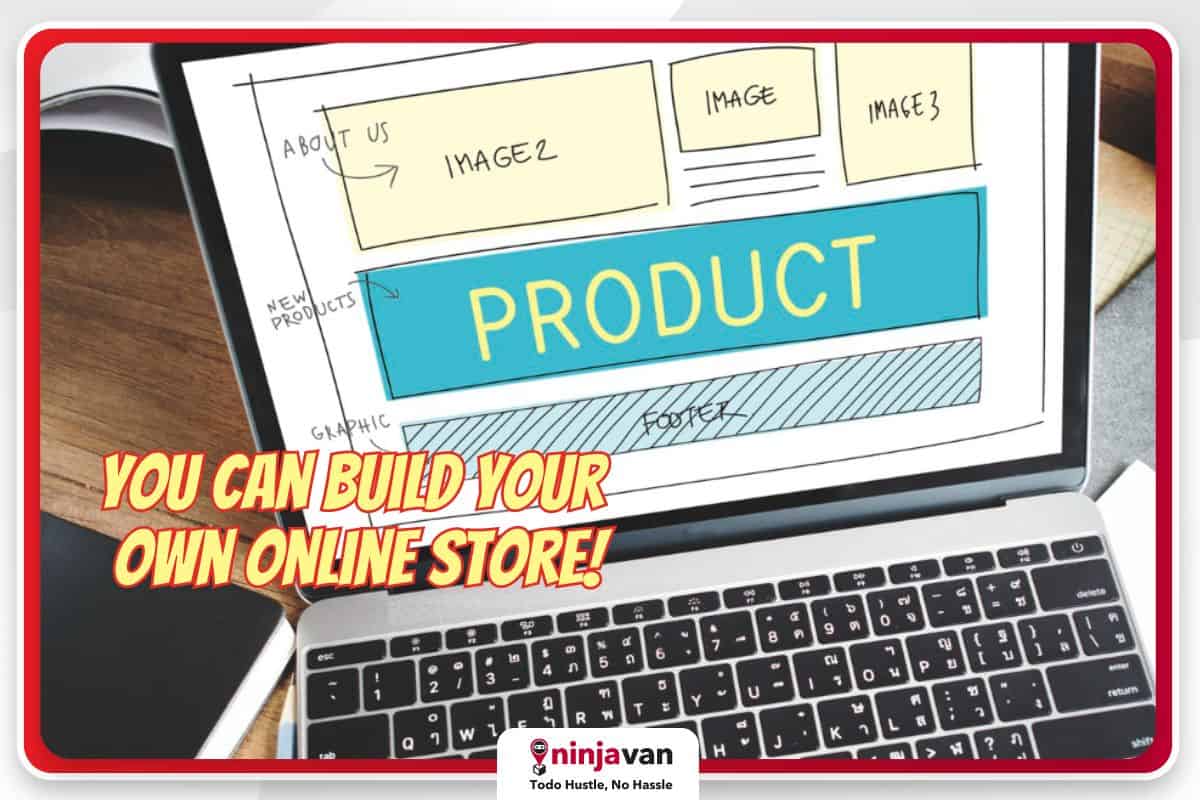Creating an enjoyable online shopping experience will build a lasting impression for first-time visitors and turn them into suki customers. Big companies even hire specialists and spend money to ensure a smooth user experience for their ecommerce websites.
But what if you’re on your own? Building your own ecommerce website from scratch can seem difficult for a beginner like yourself, but it’s not impossible. There are options for ecommerce website builders that don’t require coding or big tech know-how.

Kaya this article will help you choose the best ecommerce website builder for on your online shop. Let’s start!
What is an ecommerce website builder?
An ecommerce shop builder is an online business software that helps you create a professional-looking online store without any prior coding knowledge.
It’s a single platform that allows you to do everything ecommerce related: manage inventory, payments, shipping and everything else you need to run an ecommerce store.
Not all ecommerce website builders may offer everything you need to create your custom store. When choosing the right one, there are several features to consider:
- Ease of use
- A wide array of useful features
- A selection of beautiful templates
- Affordability
- A payment system that you can rely on

shouldn’t be that hard.
#NinjaTip: Cut your shipping costs when you become a Ninja Van VIP Shipper. Enjoy exclusive shipping rates, fast COD remittances, plus monthly rewards and rebates. Find out how you can become a VIP Shipper today!
What is the best website builder for ecommerce?
Based on features, reliability and ease of use, you can choose from this list of ecommerce website builders:
1. Shopify
Shopify started in 2004 when Tobias Lütke, Daniel Weinand and Scott Lake wanted to launch an online store to sell snowboarding equipment.
Unimpressed with the ecommerce solutions they found, Lütke decided to build his own. This became the foundation for Shopify’s technology; the Shopify platform was officially launched in 2006.
Pros:
- Easy to use: You can have a well-designed online store that integrates with all the other tools you need to run your business without knowing how to code.
- Variety of features: You can use the built-in marketing tools, digital gift cards, shipping discounts and support for 133 currencies to help launch your business.
- Customer service: Shopify’s customer support team is top-notch. They’re always friendly and ready to help.
Cons:
- Limitations on product uploads: People with large product catalogs may be well-advised to avoid it, as Shopify and Shopify Plus both have strict options and variant limits per product.
2. Woocommerce
WooCommerce has been around since 2011 and has grown to become one of the most popular online shop builders for businesses of all sizes, with over 4.4 million live websites using it.
Pros:
- Strong content management system: WooCommerce is built on WordPress, which means you can use the same user-friendly content management system for your blog and ecommerce website.
- Data control: With this ecommerce shop builder, you can easily export your customers’ purchase data, like their order history, to help you make informed business decisions.
- Setup wizard: The wizard can handle your basic needs of a new online store. However, if you want to do something more advanced, you’ll need to install plugins or use custom code.
Cons:
- Dependent on WordPress: The free WooCommerce requires a WordPress website to run (this is WordPress.org, not the free version WordPress.com). It isn’t a standalone ecommerce platform like other options.
3. Wix
Wix is a web development platform founded in 2006 by Israeli developers Avishai Abrahami, Nadav Abrahami and Giora Kaplan. Designed for entrepreneurs and small business creatives, Wix is a highly customizable platform that offers a range of free themes, a simple setup and a user-friendly drag-and-drop interface.
Pros:
- Pre-made templates: Wix features an intuitive interface that lets you edit everything from design to content without needing to know how to code. Use the free domain name and one of the almost 1,000 pre-made templates to set up your online store right away. Also included are 975+ pre-built templates you can use as a starting point for your online store.
- Unlimited products and revenue: Other providers place caps on the number of products or revenue you can generate to encourage upgrades, but Wix does not.
- Affordable package: Wix’s cheapest plan offers 20 GB of space, abandoned cart recovery and the ability to sell on social media. You can also leverage Wix’s online booking platform to sell services, classes and items at a store.
Cons:
- Required branding on free package: Free sites hosted on Wix are forced to include Wix branding on your site.
#NinjaTip: Seamlessly integrate Ninja Van’s ecommerce API into your ecommerce platform so you can have automated order creation, generate airway bill, update event status, track your parcels real-time and many more features! Learn more about it here!
4. BigCommerce
As one of the most flexible and scalable ecommerce platforms available, BigCommerce allows you to build a website that can support your growing business. It offers offers an intuitive interface, making it user-friendly even for beginners.
Pros:
- Multichannel integration: BigCommerce is a web-based application that allows you to build multichannel online stores that integrate with Amazon, eBay, Google Shopping and other sales channels.
- Variety of designs: BigCommerce offers a variety of customizable and ready-to-launch designs, so you can quickly set up your online store.
- SEO-Friendly: BigCommerce offers robust SEO capabilities, allowing you to optimize your site for search engines. This includes customizable URLs, metadata control, and options for product optimization.
Cons:
- Limitations on revenue: The cheapest plan is capped at $50,000 in annual revenue. So, it’s a reasonable choice for small businesses but will quickly become inadequate for larger shops.
5. Sentro
Sentro is the Philippines’ first homegrown platform for building an ecommerce website. With Sentro, you can accept payments, manage inventory and make bookings for deliveries in one place.
Pros:
- Complete ecommerce store: Sentro allows you to create an online store quickly and easily through a plugin to build a fully-functioning website. You can create a complete ecommerce site without the need for any additional plugins or third-party services.
- Payment features: Sentro is powered by UBX (a subsidiary of Unionbank). Its payment gateway feature offers customers over 50,000 locations, mobile wallets, and other payment options.
- Delivery services: Sentro’s courier services are integrated with options for delivery services.
Cons:
- New platform: Sentro is fairly new, so there may be a lot of upgrades along the way.
Ecommerce website design and features to have
Always think of your customers as you plan and build your ecommerce website. Imagine them in a physical store, without anyone but your products and store layout to help them find what they need.

So, of course, your online storefront needs to stand out from your competitors. Here are the ecommerce website design trends and features that will serve as its foundation.
Prioritize mobile-first design
More people now shop using their phones. Reach out to millions of potential customers with a mobile-friendly website. No one wants to look at an unreadable page that’s designed for a desktop.
A user-friendly interface should be your top priority to give your customers a seamless shopping experience.
Show and tell
What’s the first thing you want your readers to see when they click on your site? What’s your goal after one minute of navigation? What makes your brand unique?
Make sure your website is part of your strategy for engaging and converting customers. It should be easy for customers to browse through your products and complete a purchase.

through your products and make a purchase.
Navigation takes center stage
Even the racks at an ukay-ukay shop are organized based on the type of clothing. Make sure that people can easily navigate your ecommerce website! A straightforward menu is key to effective navigation, with easy pathways to your product pages and checkout.
Provide an interactive experience
Since you can’t be there beside your customer as they browse your ecommerce website, show them the best of your business with an interactive experience.
From an image gallery to videos on how to use your products, to polls that seek their feedback — these interactive experiences will make their online shopping more personalized.
Make your products searchable
The smallest feature can make the biggest difference. A search button or field allows users to find out if you have the exact product they need without clicking through the menu and categories. Tag all products correctly so nothing gets lost or mismatched.

your ecommerce website.
Showcase each product
Every product is unique, and every product deserves its own spotlight. Make sure each product gets a unique landing page with clear photos, complete details and punchy descriptions.
Using the right keywords and following ecommerce SEO best practices will guide customers to the product pages and lead them to a smooth checkout.
Pluck and pop
Given the small size of a typical smartphone screen, don’t overwhelm customers with too many elements. Pick the right products to feature on the homepage, and always check if floating elements are getting in the way of navigation.

However, you also don’t want your website to look dull! Step away from monochromatic hues and choose vibrant colors for select portions of your websites.
Understanding the psychology of brand colors can help push visitors to your desired action.
Use a chatbot
Fast response to customer inquiries is mandatory these days. Instaling a Facebook Messenger chatbot feature will provide customers with auto-responses, giving them 24/7 customer service!

Easy checkout
Avoid cart abandonment by providing customers with a smooth checkout experience and a range of payment options.
Build your ecommerce website right
Building the best ecommerce website for your business isn’t just about choosing the most affordable builder. You should base your decisions on factors that are going to make the biggest difference in your long-term success.

can make or break your online success!
For many, this means choosing a store builder that offers a wide range of features, great customer support, affordable plans and dedicated ecommerce tools that offer many online selling options.
More importantly, your ecommerce website is an integral part of your digital marketing strategy. Therefore, choose a platform that will make it easy for you to do ecommerce SEO so you can build a strong online presence.
In the end, you should always aim to build the best website possible – one that reflects your unique identity, with optimized product pages and can make sales automatically once it’s up and running.
More tips for your ecommerce website:
Choosing A Domain Name For Your ECommerce Store
5 Effective Traffic-driving Tricks for Ecommerce
Protect Your Ecommerce Website from Online Threats






